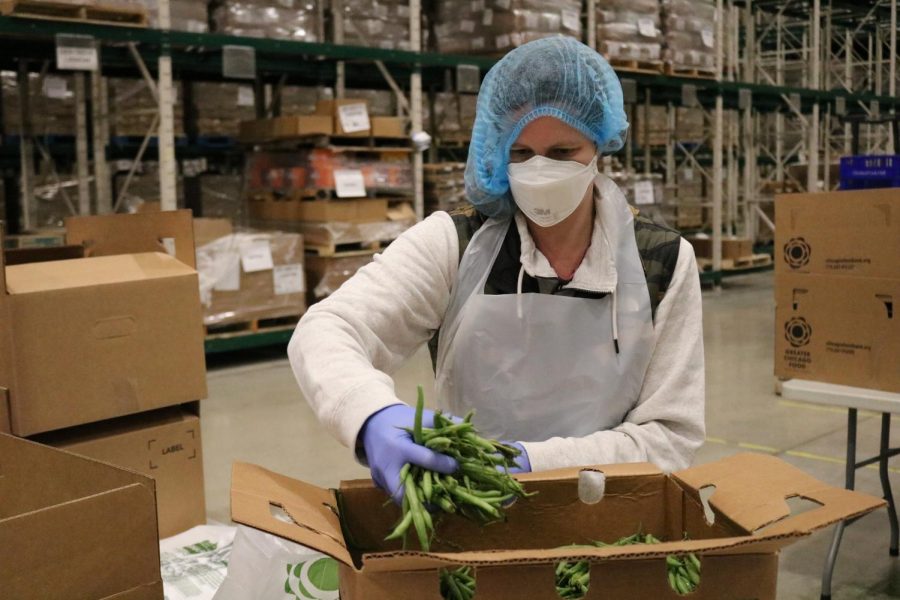Evanston food assistance programs adapt to pandemic precautions amidst growing food insecurity
courtesy Greater Chicago Food Depository
A volunteer packs produce at the Greater Chicago Food Depository’s warehouse.
July 6, 2020
Over three months after Illinois began implementing statewide stay-at-home orders and precautions to address the COVID-19 pandemic, Evanston food assistance programs are settling into a new normal of socially distanced operations, limited volunteers and a surge in patrons.
For Evanston Vineyard Food Pantry — which serves up to 275 families from Cook County each week — that new normal is a tented, five lane drive-thru in the parking lot of Vineyard Christian Church, serviced by volunteers in face masks, gloves and neon vests delivering pre-packaged bags of non-perishables and fresh produce.
Lisa Haskin, the pantry manager, said the operation has become a “well-oiled machine” since April, despite having to half their volunteer corp for social distancing purposes. Haskin noted the service quality hasn’t been impacted by the smaller team, and that filling those volunteer positions with local adults and teenagers hasn’t been an issue.
“We’ve actually had less of a problem finding volunteers,” Haskin said. “I think it’s on a lot of people’s minds who have food on their table and know that there’s people that are much less fortunate. It’s much more prevalent that people are thinking about serving to help out in this time.”
According to coronavirus hunger research from Feeding America, a U.S.-based hunger relief nonprofit, about one in seven people in Cook County will experience food insecurity this year due to impacts from the pandemic, up from one in 10 people in 2018.
Haskin said she’s seen this trend reflected in the rise of the number of families the pantry serves, which she said has grown from 200 families to about 250 to 275 families since March. While its core group still consists of retired individuals on fixed income, working poor people and families, and single parents, she attributed the spike to an increase in folks who have recently lost their jobs and need temporary assistance.
Tracy Alden, a longtime volunteer at the pantry, said the pantry has reworked its food distribution method to meet this growing demand. It has eliminated the “return cart counter,” where patrons could swap items, to prevent people from handling multiple items of food. This, along with monitoring intake from the Greater Chicago Food Depository, has helped the pantry limit its food waste and allow them to pre-package 12-item bags with a variety of goods.
“It’s been quite an amazing thing to see,” Alden said. “We can serve everyone — we can even serve more than one family, we serve however many are in the car. If there’s three families, they’re going to get three sets (of packages).”
The Producemobile, which provides fresh produce to around 290 low-income residents every two weeks, has seen similar adjustments, according to core volunteer Shawn Iles.
It has also reduced the number of volunteers in compliance with GCFD guidelines, only recently regaining a large base of retired volunteers over 60 years old who were restricted from working. In a change from pre-pandemic operations, volunteers now receive pre-packaged boxes of meats, fruits and vegetables, and dairy from local vendors to distribute.
The truck now runs twice a month instead of once to keep up with demand, establishing a drive-thru and socially-distanced walk up procedure. To ensure limited food waste — the GDFC doesn’t allow the Producemobile to throw away any leftover goods — the program partners with local pantries to donate excess food, Iles said.
Iles, who also serves on the city’s COVID-19 Food Insecurity team, noted that while transitioning to pre-packaged services ensures less exposure, these procedures can remove agency from patrons who already face limited choices when relying on food assistance. He acknowledged people can no longer choose which products they may or may not need, but that only around 5 percent of patrons have voiced their concerns with the contents of the pre-packaged boxes.
“I was a little bit worried about it, but when I opened up the boxes to show the volunteers what it looked like, it was fantastic, and it was as good a produce as we’d ever received,” Iles said. “But it’s less personal. Everybody appreciates when they’re given an opportunity to select their own produce.”
As the reopening status of the county continues to ebb and flow, Iles is confident that procedures for the Producemobile will return to pre-pandemic standards. However, Alden voiced uncertainty about the safety of allowing volunteers and patrons to handle more goods or transition back into the church.
Yet no matter what the status of the pandemic or the pantry’s operations, Alden doesn’t think twice about continuing his volunteer work.
“I’m an old guy and I’m retired, but I never felt threatened or inhibited from helping,” Alden said. “Safety first, that’s what it has to come down to — people need food.”
Evanston Vineyard Food Pantry, 2495 Howard St., is open from 6 p.m. to 7 p.m. on Wednesdays. The Producemobile is stationed at the Levy Center. For more information on health and nutrition resources in Evanston, visit the city of Evanston’s Food Accessibility and Assistance page.
Email: [email protected]
Twitter: @daisy_conant
Related Stories:
— Everything Evanston: Food Pantries in a Pandemic
— Producemobile to provide fruits and vegetables Tuesday
— As food insecurity rates balloon, city officials open emergency pantry at James Park












